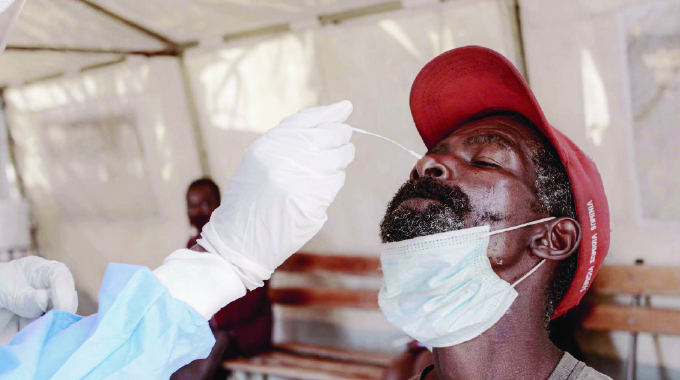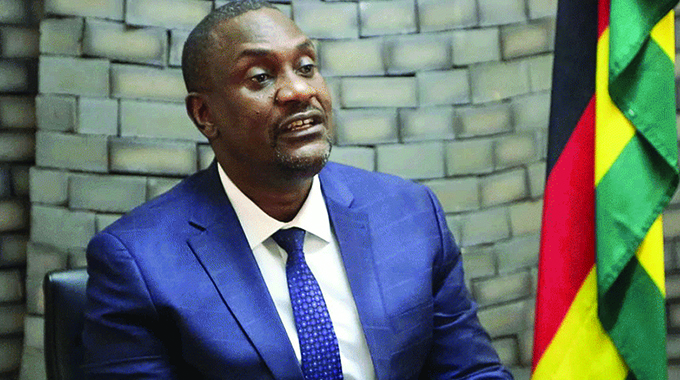Covid’s grim milestone…The pandemic in Zimbabwe two years and four variants later

Nqobile Tshili, Chronicle Reporter
ZIMBABWE yesterday marked exactly two years since recording its first Covid-19 case, taking it through four waves of the pandemic and emerging stronger than some well-resourced countries.
On March 20 2020, a Victoria Falls resident, Mr Graham Simmonds, who had travelled to the United Kingdom became the country’s first confirmed Covid-19 case while journalist Zororo Makamba succumbed to the virus on March 23 2020.
Two years later the country has recorded more than 244 452 cases, 234 270 recoveries, 5 423 deaths and 4 700 active cases.

Thorngrove Hospital in Bulawayo ready to get Covid-19 patients
The pandemic saw Government introducing national lockdowns, mandatory wearing of face masks to contain the spread of the virus while capacitating health institutions to handle those that needed treatment and hospitalisation.
Initially, only Wilkins Hospital in Harare was designated a Covid-19 treatment centre but now all the country’s provinces are able to handle severe Covid-19 cases.
Zimbabwe basks in glory of having one of the leading Covid-19 vaccination programmes on the continent and today the country is launching a massive vaccination programme for it to achieve herd immunity.
So far 4,4 million citizens have received Covid-19 first jab as 3,4 million have received their second dose and 177 000 have received their third jab.

A local man getting tested for Covid-19
The country is targeting to vaccinate at least 10 million citizens for it to achieve herd immunity.
In an interview, national Covid-19 co-ordinator Dr Agnes Mahomva said the country has come a long way in its Covid-19 management programme.
“As a country we are very proud of the successes that we have managed to accomplish. We hit the ground running at the beginning of the pandemic. Remember in March 2020, we had already launched our National Preparedness and Response Plan which was launched by His Excellency.
We specifically put the Cabinet inter-ministerial taskforce that made sure that we were following the whole of Government, whole of society and everyone on board and all those preparations at the very start of the pandemic made sure that our national response was very strong,” said Dr Mahomva.
“We were very clear in terms of the strategies we were guided by World Health Organisation pillars of responding to the pandemic. We have never looked back.”
She said the country has managed to navigate through four waves of the pandemic which have served as a learning curve for the country in case management.

First batch of vaccines arriving in Harare from China
Dr Mahomva said following the strategies that were adopted by the country, Zimbabwe has recorded fewer deaths compared to some well-resourced countries.
“You’ll notice that we didn’t get hit by a large number of cases if we compare to other countries. We also managed to introduce the vaccination programme earlier than anyone in the African continent.
As we speak our vaccination programme remains one of the leading programmes in the African continent.
You are aware starting tomorrow we are doing a vaccination blitz to ramp up the programme which is already very successful. We want to get everybody who is eligible for vaccination,” said Dr Mahomva.
She said the pandemic saw the nation rising above its challenges and capacitating health centres in handling cases that required admissions.
Government also capacitated isolation centres and quarantine facilities for members of the public and provided meals at those places.
Institutions including Ekusileni Medical Centre can now admit Covid-19 patients.
Dr Mahomva said the country has also managed to substitute imports as local manufactures are largely supplying the local market.
“We built capacities in terms of testing, in terms of health facilities, when we started, we only had Wilkins Hospital and another facility in Bulawayo.
But since that time, we strengthened and built capacity to a point where every single province has got isolation facilities and a number of Intensive Care Unit facilities were set up in Government and in the private sector which are big successes,” said Dr Mahomva.
“We also built capacities for manufacturing locally, for import substitution. When we started, we were importing masks and other PPEs, but when you look around over 90 percent of the PPE is manufactured locally and that again is another success.”
She said past experiences are preparing the country for future Covid-19 waves.
Dr Mahomva said from the country’s Covid-19 management there is hope at the end of the tunnel.
“We have learnt a lot of lessons and the pandemic is still here like all over the world. We are aware the numbers are beginning to go up in China and America. But the good thing is we learnt some lessons, we have had experience.
We are not in a panic mode, we are very ready because the strategies required to manage any cases are very clear and we are ready to continue strengthening and moving on,” she said.
Dr Mahomva said while other countries have started relaxing Covid-19 regulations including making optional the wearing of face masks in public, the country was not yet to take that route.
She said the threat of a fifth wave is real hence it will not be proper to let the guard down yet.
“This week we saw a fake news circulating saying Zimbabwe has scrapped face masks. No, we have not, but moving forward clearly a lot of things will change.
Later, we may reconsider but at the moment we have not. We are being strategic. Numbers are going up in China, in America and that is exactly how the pandemic started so it will not make sense for us to relax everything now but to remain vigilant, to continue strengthening our national response,” said Dr Mahomva.
She encouraged citizens to get vaccinated for the country to achieve herd immunity and return to normalcy.
“We did have a survey that was done in September 2021 by a global team of experts, we do this regularly, which clearly indicated that over 92 percent of people are willing to be vaccinated in Zimbabwe.
The main challenge is the low-risk perception. In other words, people seem to think at an individual level that Covid-19 is not going to do anything to them.
They say ‘the pandemic is there but is not going to affect me’. Hence, because of the low-risk perception, they don’t go out to be vaccinated. This doesn’t mean they are not willing to be vaccinated but they are procrastinating because of the low-risk perception,” said Dr Mahomva.
The vaccination blitz, also targeting the 12 to 15 years age group starts nationwide today.
In February, Government gave the green light for the 12 to 15 years age group to be vaccinated against the Covid-19 after getting science-based guidance from the Paediatric Association of Zimbabwe.
The country had been vaccinating only the 16 years age group going upwards.
Bulawayo City Council in partnership with the Ministry of Health and Child Care will from today embark on a two-phase vaccination program around Bulawayo metropolitan province.
In an interview, Bulawayo Provincial Medical Director Dr Maphios Siamuchembu said:
“We are appealing to parents to encourage and allow their children to go and get vaccinated. There has been lots of false information going around that the vaccine will cause harm. The vaccination is just like any other vaccines that people are getting from the hospitals.”
The blitz will take place at all municipal clinics, central hospitals, Mater Dei Hospital, all primary and secondary schools and outreach points.
The first round will take place from today to April 4, and the second round will take place from May 2 to May 15.
“We have been fighting this disease for two years now and we have gathered information and evidence that shows that the people who are dying from Covid-19 are those that have not been vaccinated against Covid 19.
“The ones vaccinated are also dying from the disease but these will be people who have other comorbidities that are already putting their lives in danger,” he said.
He said as the country approaches winter, it is important that people get vaccinated to reduce casualties.
“We anticipate that in winter we are going to be hit by another wave and we would love that when it comes, it finds us protected so that we minimize casualties from Covid-19,” said Dr Siamuchembu.
-@nqotshili










Comments